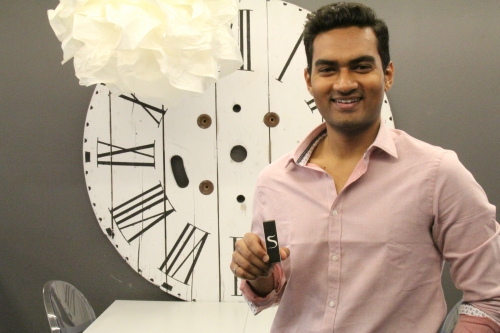
Chemical engineering graduate Akash Gupta, a co-founder of Seleste Lipsticks with fellow student Sravya Kalyanapu, is now turning his focus to a career in finances.
(Edmonton) Akash Gupta's engineering education has thrown many challenges his way, from the common struggles of adapting to university life to conducting sophisticated research to improve the efficiency of liquid gas production and steam-assisted gravity drainage oil sands operations.
But the thing that stands out the most about his undergraduate years is lipstick.
That's right. Lipstick.
Last year Gupta and fellow engineering student Sravya Kalyanapu launched their own brand of lipstick, called Seleste Lipsticks, with the support of eHUB, the University of Alberta's entrepreneurship support centre. The entrepreneurial duo hope to one day bring their all-natural product into top cosmetics retailers like Sephora.
It all began when Gupta accompanied his mother and sister on a shopping trip. The two were busy buying makeup. After seeing what he considered outrageous prices for lipstick, Gupta, who is graduating with a degree in chemical engineering, couldn't resist the urge to investigate the ingredients-he wondered what went into the product to make it so expensive.
His years of studies failed him.
"I like chemistry, and I'm a chemical engineering student, and I could barely make out the names of the ingredients," he recalls. "I couldn't pronounce half the words."
He and Kalyanapu decided to try to create a high-quality lipstick of their own using natural products, and sell it at a more reasonable price. And Seleste Lipsticks was born.
Here's something most people don't know about chemical engineering: it isn't all about chemistry. It is, rather, about inputs and outputs; it's about turning ingredients like the ones Gupta tried to read on the side of a lipstick box into lipstick itself.
Making lipstick in your home doesn't require a lot of work on mass balances and energy transfer and at this scale you don't need to hire a process engineer. But Gupta credits his engineering education with developing a problem-solving skill set that allowed him and Kalyanapu to develop a product that uses natural ingredients (with names that anyone can read) and looks great.
When it came to applying the higher concepts and skills of chemical engineering to more complex projects, Gupta was part of a final capstone project that took a deep dive into the oil and gas sector.
The team designed a plant integrated with an oil sands steam-assisted gravity drainage (SAGD) facility. These facilities produce a lot of heat to help liquefy bitumen and the team planned to take advantage of that energy to help produce jet fuel at the same time.
"Our economic analysis showed that it isn't feasible, or has limited economic potential, but finding out that something doesn't work is part of being thorough, and we did look ahead to things that can be worked on in the future to make this work."
Economics connect lipstick and jet fuel, and if those weren't broad enough areas of interest, Gupta is now taking his education in yet another unexpected direction-also based on economics.
This summer he's joining RBC Capital Markets as a researcher after spending the past two summers working as a currency trader for the company.
"I've always had an interest in finance and equities and stocks," he said. "I'll get a set of companies to research and be the analyst for those sets and help come up with buy, sell, or hold ratings."
Gupta and Kalyanapu will continue to operate Seleste, he says. That work, and his new career, will help feed his entrepreneurial spirit-it's a way of doing things that he finds tremendously rewarding.
"Growing up, my mom had her construction business in Fort McMurray and she built 12 or 13 homes in front of me. I was in on everything from the design to the finishing touches," he recalls. "The idea of producing something of value to society is appealing. And that is what entrepreneurship allows you to do."